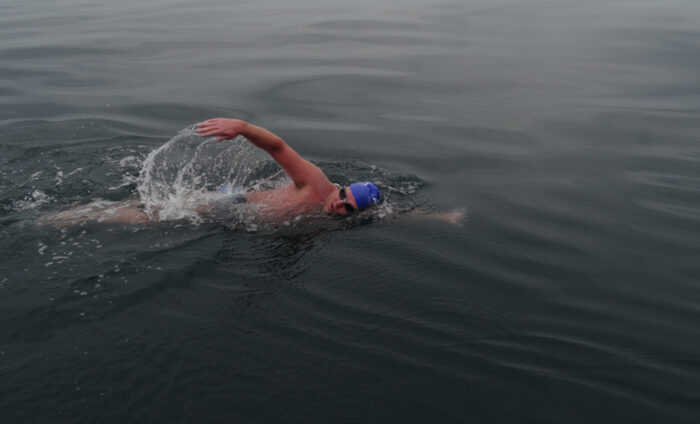
9 Steps to Mental Toughness
Ask any marathon swimmer what the hardest part of every swim they do is, and you will nearly always hear the same reply. It is rarely the cold, the fatigue or the elements that they struggle with the most. For most swimmers, it is battling with the mental demons that make them doubt their own capabilities. Extreme emotional lows often come straight after an extreme high and hit you like a brick wall. Working with this emotional rollercoaster is essential for success.
As Alison Streeter, Queen of the English Channel, says: “A channel swim is 90% mental and 10% the rest.” It is hard to understand this until you have been there, but this statistic is the general consensus in the marathon swimming community. If these challenges were easy then everyone would do them. What sets many a successful swim apart is the indomitable will and mental strength of the swimmer. The key is preparation and planning for the inevitable rollercoaster of emotions. This is true whether you’re swimming the English Channel or staring down the slipway to start your first open water mile.
What can you do to prepare for and conquer your own psychological battles?
1. Anticipate them in advance
The vast majority of swimmers will experience mental low points. They can hit you when you least expect it. It could be the temperature being colder than you thought it would be; it could be the pilot telling you to swim faster; or even just a worried look on a crew member’s face. The smallest seed of negativity has the potential to grow into a monstrous oak and when those thoughts come, they come hard and fast. Plan for that fact and you will be able to handle it much better than if it is a surprise.
2. Master your emotions in training
Give your mental training the same attention that you give your physical training and conditioning. Learn what motivates you and what has the power to snap you out of a bad mood. What makes you laugh? What makes you smile? What makes you feel positive and full of joy? These are the things you need to focus on when you hit the wall and the best place to do that is in your practice sessions. Schedule long, cold painful swims in your practice and you will be able to experience these emotions in order to test your safety nets. Learn what works and push yourself to your limits. Soon you will discover that you can pull yourself out of the darkest of places.
3. Embrace the highs and the lows
Now you know what is coming make sure to go with the flow. Enjoy the highs that you will experience along the way and when you do hit a low, just remember it will pass. How quickly it passes is up to you. Once it has passed, you will be so proud that you handled it. Make yourself conscious of the fact that you survived it and that any future ones you hit will also be temporary. This mindset helps to stop negativity and you will soon realise that it really is not the end of the world!
4. Nip the negative emotions in the bud
When you feel yourself slipping into a low point, try and pull yourself out of it before it gains traction. Change your focus to something positive like how lucky you are to be experiencing such an amazing and unique adventure. How many people get to be where you are right now? How proud will everyone be when you return victorious? There are many ways to “change channel” in your mind when you feel yourself starting to slip and the sooner you do it the easier it is to stay positive.
5. Play around with the idea of time
If you are eight hours into a long swim and are really struggling, just think of it as a day’s work. Most people are in the office for longer than that so think of the sea as your office for the day (and maybe a bit of the night too). Normalising the situation can help to overcome the gravity of the negative emotions. Fast-forward in your mind to the end of the swim. Even if it takes you another eight hours, when you have finished it, what you have just done is in the past and the pain will no longer be relevant. If you get tempted to get out early, again just fast-forward in your mind to how disappointed you will be in yourself when you could have possibly carried on. What you are going through will soon be in the past, so push through in the present where it matters.
6. Dissasociate your mind
If you do end up in an abyss of negativity then a very useful thing to master is the art of dissasociating your mind from your immediate situation by taking it elsewhere – such as a nice warm bed or bath. This is surprisingly easy to do. Simply use your imagination and take yourself off to a new place. You will soon start to feel much more comfortable and relaxed.
7. Celebrate your successes
If you are attempting a marathon swim, it is unlikely to be your first taste of an open water event. You will also most likely have put in a lot of long training hours to get where you are, so celebrate those successes. Remember you have been here before (perhaps to a lesser scale), so this is not unfamiliar territory. Use your successes in smaller challenges, even as small as completing a hard pool set, to your advantage. This will give you surprising amounts of mental strength and confidence when you most need it.
8. Deal with the cold and pain
The thing that makes most people fall head first into an abyss of negativity is the extreme discomfort caused by the cold and the physical exertion. It can often be a big surprise to the swimmer just how cold and how uncomfortable it can get. News flash! It will be cold and it will hurt. These are factors you cannot control so don’t waste your time obsessing over them and instead focus on things you can control, like your thoughts. Focus on the exact opposite of cold and pain, ie, warmth and comfort, so that your mind is incapable of processing the reality. You are the master of your thoughts and with enough effort you can control them to your advantage.
9. Embrace the whole experience
What you are doing is incredible. Most people will never experience this degree of being at one with nature or contemplate taking on such a huge challenge. Reflect on that and remind yourself that anyone can be ordinary. You are here because you are extraordinary.
Expert Advice
Ed Williams is the head coach of Elite Swimming Academy in Cambridgeshire and Suffolk. He is also one of the few people in the world to have swum solo across both the English Channel and the North Channel so knows a thing or two about mental toughness.








